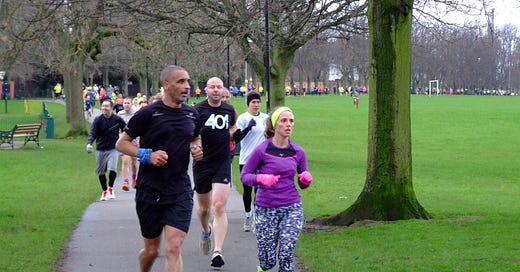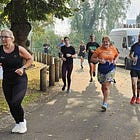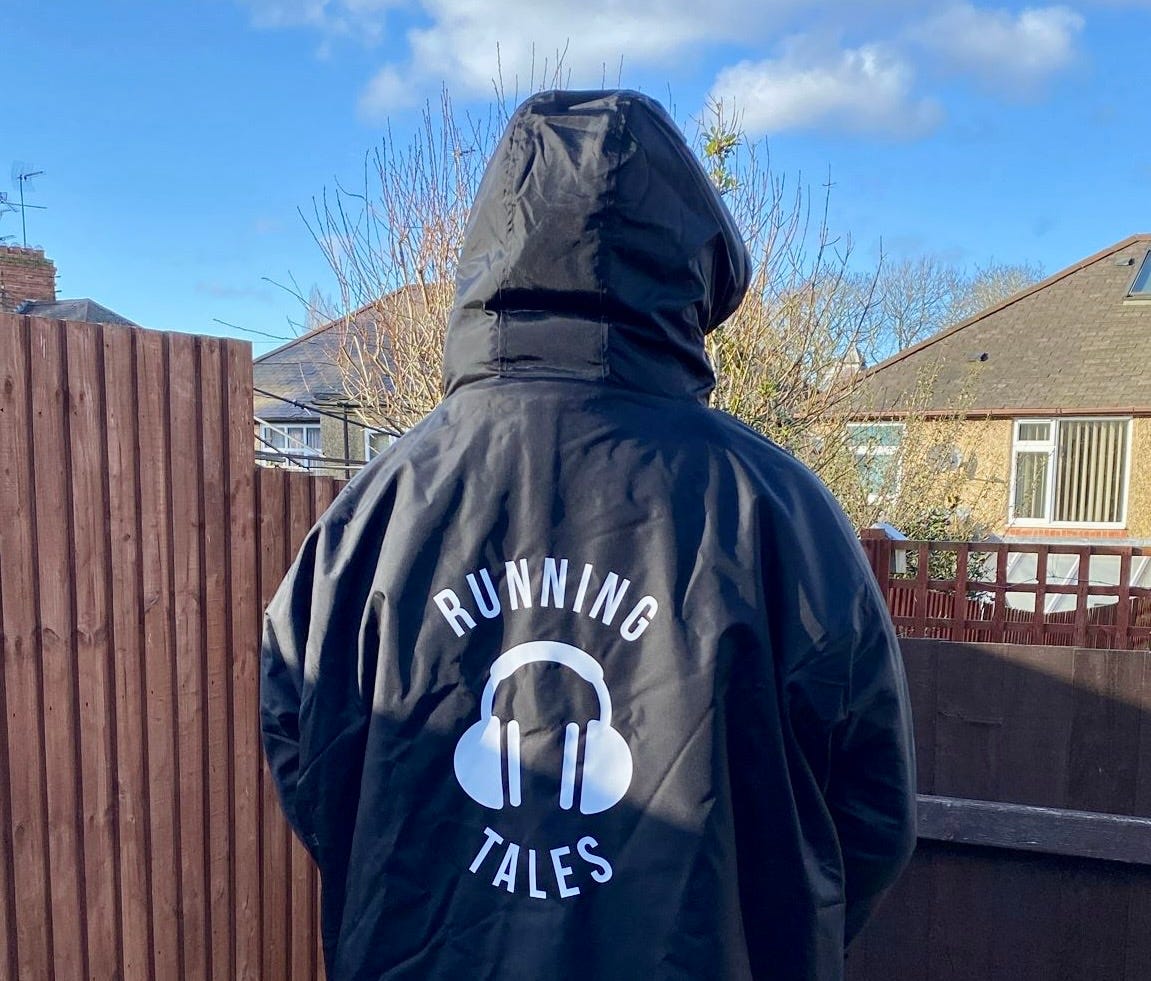If you’re only going to run one ultra, why not make it the toughest footrace on the planet?
Studney Kirby has run marathons all over the world and hundreds of parkruns, but MDS remains his only ‘daddy’ ultra
The planning, promotion, podcast recording and writing of this article took five to six hours of work. Please back what we do by subscribing to Running Tales and considering ‘buying us a coffee’ ☕️ Thank you 🙏
If you’re only going to do one ultra marathon, why not make it the ‘toughest footrace in the world’?
Studney Kirby is a real running all-rounder with marathons across the globe, around 50 half-marathons and almost 500 parkruns to his name.
But his one and only foray into the world of ‘daddy’ ultras came back in 2004 when he completed the 19th edition of the Marathon des Sables (MDS).
Studney even told Running Tales that the legendary seven day race, which takes in about 160 miles (257km) through the Sahara Desert, was “easier” than he expected.
But despite having also completed two shorter ultras - one over 30 and one at 40 miles - he insisted he has no plans to tackle MDS again, adding that generally he finds the ultra distance “just too long”.
Instead, Studney - who has already finished marathons in Paris, Chicago, New York, Barcelona and London, the last one four times - has his eyes fixed on a sub-three hour marathon and the possibility of completing the World Marathon Majors.
But, despite his love of the sport, the Wellingborough and District Club runner might not have been running at all if it hadn’t have been for an off-the-cuff bet with an old boss.
‘I can do a marathon an hour quicker than you’:
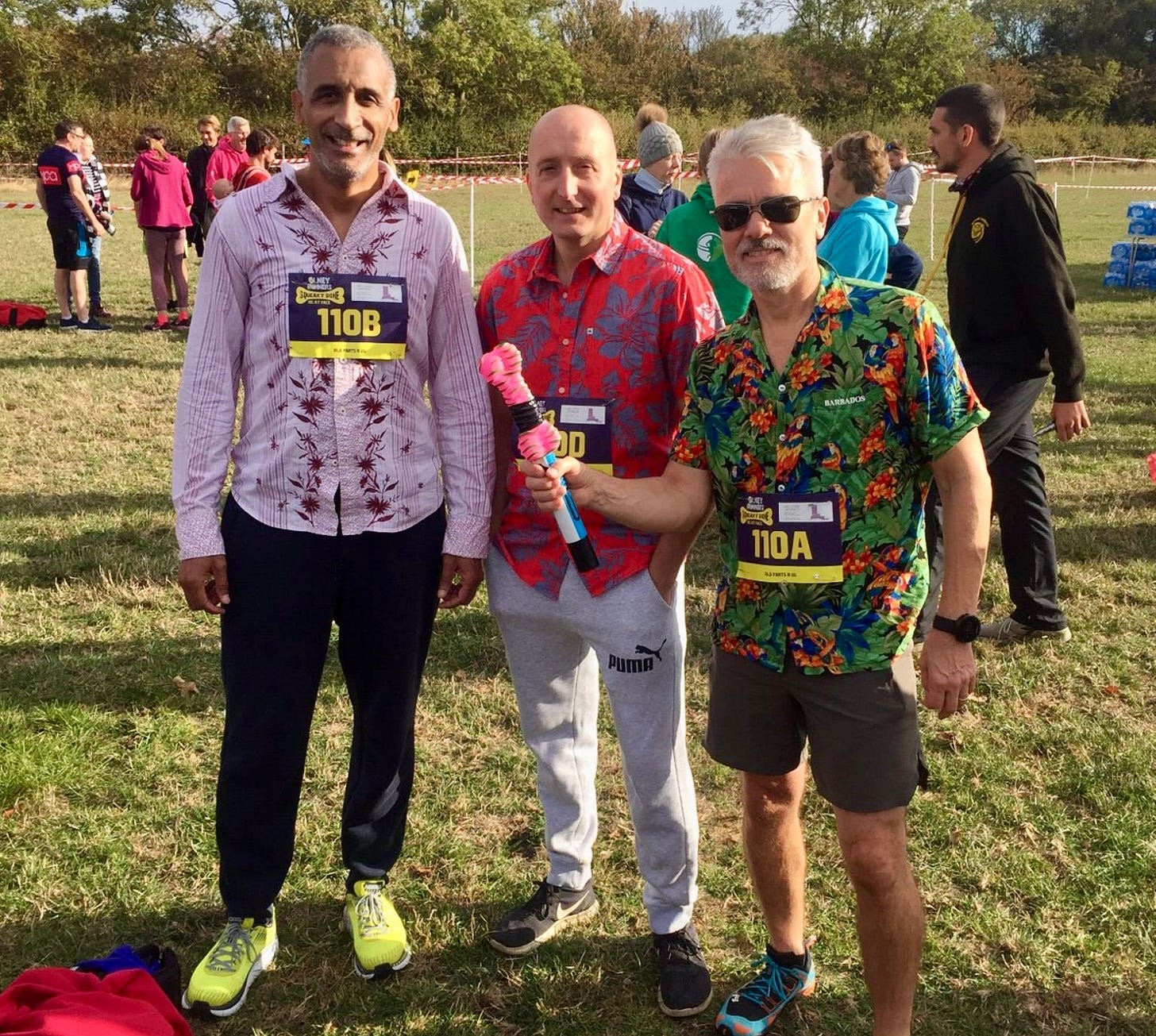
At school, Studney ran in the 800m and 1,500m, as well as cross-country, but when he reached his mid- to late teens he drifted away from the sport.
He told the Running Tales Podcast that running took a back seat to nights spent clubbing and days “working a lot,” with playing football and going to the gym providing his athletic pursuits.
“I don't think I ran at all for, seven, eight, nine years or so,” he said. “I do regret it now.
“I probably would have been a better runner now, but who knows? I wasn't going to set the world alight, but I think I could have run some okay times.
“And, of course, that time has gone.”

His return to the sport came in 1997 as the result of an unusual bet with his then manager at work.
“He had done a marathon,” Studney said. “And we were chatting and I was full of it. I can't remember what time he said he'd done, but I said I think I can do a marathon an hour quicker than you can.”
At that point Studney hadn’t even run a half-marathon and his over-confidence was about to catch up with him.
“I don't think I'd even done a 5k, not in a competitive sense,” he said, “but I'd seen people do marathons in two hours-something and thought how hard can it be?
“We had this challenge set that we would both run a marathon and if I did it an hour quicker than him, then I would win the bet and he would give some money to a charity.
“And if I didn’t, then vice versa. But it didn't play out quite as planned. The only good thing about it is I don't think he actually did a marathon anyway.
“So whatever time I did was going to be an hour quicker than him.”
Studney’s training saw him take on some shorter races, as well as the Ashby 20 in Northamptonshire - a 20-mile race - and another longer run in Peterborough. Although neither of those events “went to plan,” he quickly found himself lining up to take on the London Marathon.
He said: “I set off at a good pace and got to halfway in about one hour 35, but finished in four-and-a-half hours.
“The second half was painful. Three hours to do a half-marathon. That humbled me a bit and taught me some lessons.
“When I finished it, if anyone had said I was going to do another one I’d have said they were bonkers.”
But just six months later, he was running in the New York Marathon. This time, Studney gave the distance more respect, running with a friend with the idea of completing it in a steady five hours.
“Th aim was to have a good time and enjoy New York,” he said. “During that period, although the first one didn't go very well, I did think I want to do more of this. I did enjoy it.
“More importantly, I made some really good friends through running. They are still my good friends now.
“I have had periods, quite long periods, where I haven't run marathons. I've done short events and haven't trained very much. But I've come back to marathons more recently and my plan is to do quite a few more of them.
“There’s something about marathons, isn’t there? Something about having completed that 26 mile distance. If you drive it in a car you realise how far it is. I still love them.”
Running MDS before Google told you how to:

It was another conversation at work that saw Studney decide to take on the Marathon des Sables.
An ultra running friend, who was already running the event, approached him and insisted he ‘get your name in’.
Studney said: “I'm not even sure I knew what MDS was but I guess we must have discussed it at that point.
“I really had no clue what I was doing. I'd done a couple of marathons and some off-road cross country for my club, Wellingborough, but nothing of any consequence.
“But I entered and thought it'd be a great idea, we could figure out what to do along the way and that's what we did.”
Studney knew things were different when he started to train with a backpack: “It dawned on me that we would be carrying the gear for a week, food for a week, and clothing and sleeping arrangements.
“Once I started to train with that, it did get easier but I started to realise it wasn't going to be a walk in the park.”
But although training, and eventually competing in, one of the most famously tough races in the world was far from easy, Studney insisted MDS wasn’t as hard as he expected.
“They called it the hardest race on earth and the heat wasn't pleasant, but I'm not actually sure it is the hardest thing I’ve done,” he said.
“I think I've done tougher things since. Because you have so much time to do the event - on a 20 kilometre stage you probably get seven or eight hours to do it - you can literally walk. People do walk it.
“So, if you pace it right, it's certainly very doable.”
Studney said the most uncomfortable element of MDS was the heat of the desert followed by “waking up at stupid o'clock in the morning cold, because it got cold overnight - that wasn't pleasant”.
One part of the event that did provoke major challenges was just how comparably unknown it was back in 2004 at what was only the 19th edition of the event.
Whereas anyone taking on the event in 2025 would have the advantage of being able to tap into the knowledge found on hundreds of online videos and articles, Studney didn’t have that kind of collateral to learn from.
“There were running magazines,” he said. “I think MDS produced some paperwork that gave you an idea as the sort of kit that you would use.
“But it wasn't like today, when you can just Google it and you'd find everything you need.
“We went to Milton Keynes and bought our backpacks, which I still have. There was an outdoor show at the NEC that we went to and bought some kit from, but it was really just guessing what might work.”
Studney said he had to work out everything from what to eat and drink in hot weather to which kit to use. Most of his fellow runners - including TV presenter and adventurer Ben Fogle - were in the same boat.
He said: “I ended up in my tent with a few guys that were just pretty average runners, like me.
“There wasn’t a sense of ‘elite’ about the race. The only time I realised there were some really top runners there was on the long day.
“The top 50 were held back and started three hours after everybody else. I’d only gone 20 miles or so and they came past.”
Marathon majors, meeting great people… and Western States?:
These days, Studney has one eye on completing the famous World Marathon Majors, although logistics, injuries and the addition of extra events to the list is meaning that challenge remains a work in progress.
With the ballot at Berlin proving uncooperative so far and the expense of Tokyo relegating that race to last on his list, Studney had hoped to add Boston to his marathon conquests in April. Having hit the so often elusive qualifying time, he has been denied by injury and logistics.
And the decision last year to make Sydney the seventh marathon major means he is now one step further from his goal.
For now, he is planning to run London again in April before targeting a sub-three hour marathon in Valencia in December.
“It’s not getting easier, I'm not getting younger but I'm enjoying it,” he said.
“The training is great and I think I can get quicker and so that's my plan.
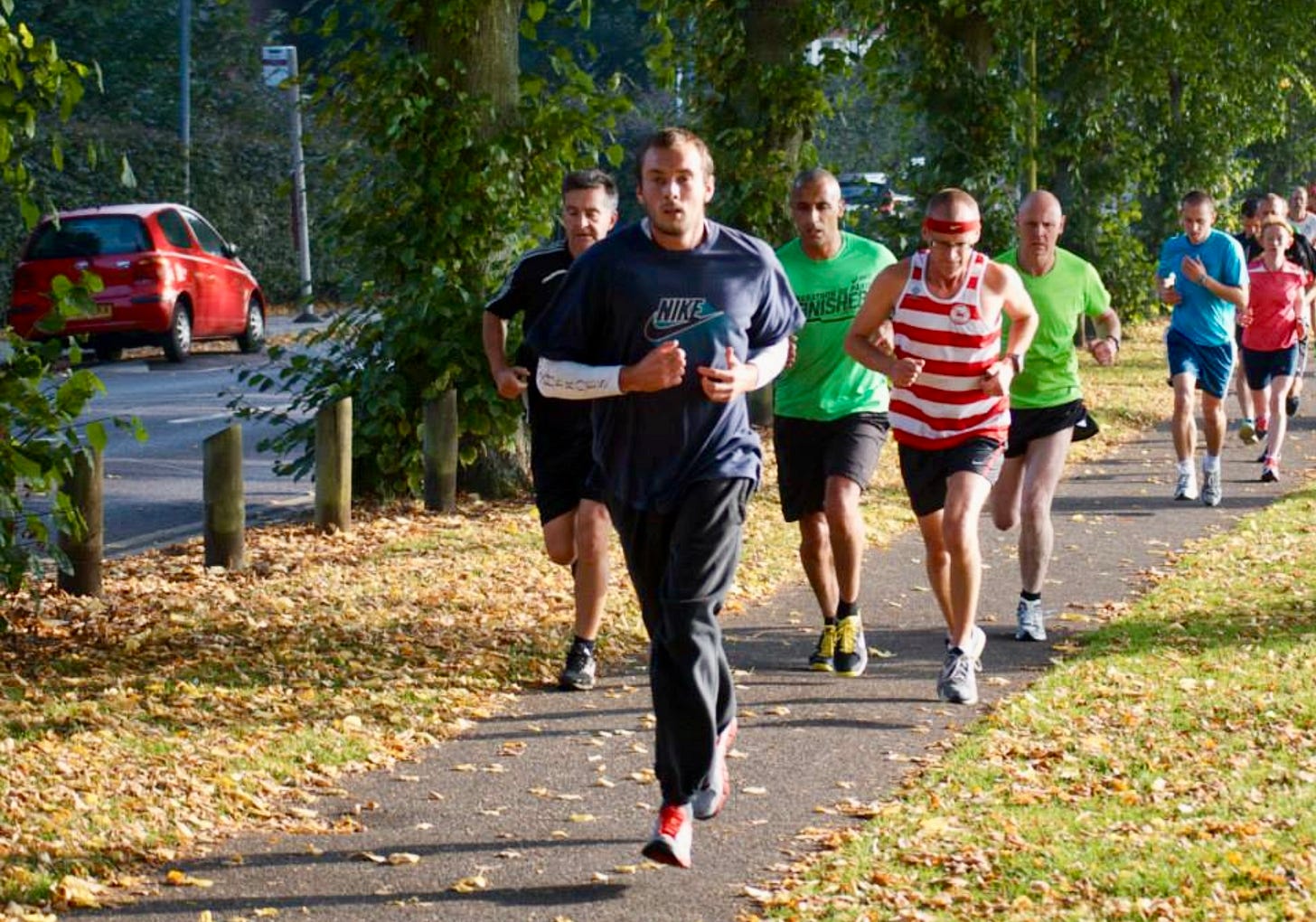
“Running is a very personal thing. There’s that old phrase, isn’t there, that you can struggle to get out the door on a run, but generally once you've done it and you get back, you always feel better.
“I’ve met lots of good people and I've been to lots of interesting places through running.
“I think if you're just starting out and you think it's something you want to do, stick with it. No matter what level you're at, just stick with it.
“You'll meet some interesting people, you'll go to some interesting places if you want to and you just have some fun and maybe you'll get quicker if that's what you want.”
And maybe, just maybe, take on another ultra marathon?
“I love the conversation that you have with yourself when you're running and you're constantly free,” Studney said.
“Evaluating how you're feeling. Can I run faster? Can I run slower? Do I need a drink? Do I need a gel?
“That whole talking to yourself while you're running and just trying to weigh up what can I do here if I'm really trying to go for a time or trying to work hard?
“So, I love that now. And I think if I was trying to do ultras, it's not about that. It's a different conversation, which I'm perhaps less inclined to want to have.
“Having said all of that, my bucket list races are still things like the Western States 100 and Hardrock in America, so who knows.”
Listen to Studney on the Running Tales Podcast:
Listen on Spotify and Apple Podcasts, or wherever you listen to your podcasts. Just search for the Everyday Athlete Podcast Network, Please remember to give us a positive rating or review.
Support Running Tales:
Please help us keep producing Running Tales across Substack and in podcast form:
Also on Running Tales:
Check out our merchandise:
Be a part of the Running Tales revolution with our new merchandise range - including our new robes.
We’ve got buffs, caps, cups, t-shirts and hoodies - why not complete your next run as an everyday runner by doing extraordinary things?

